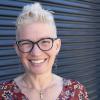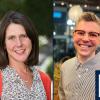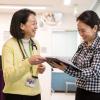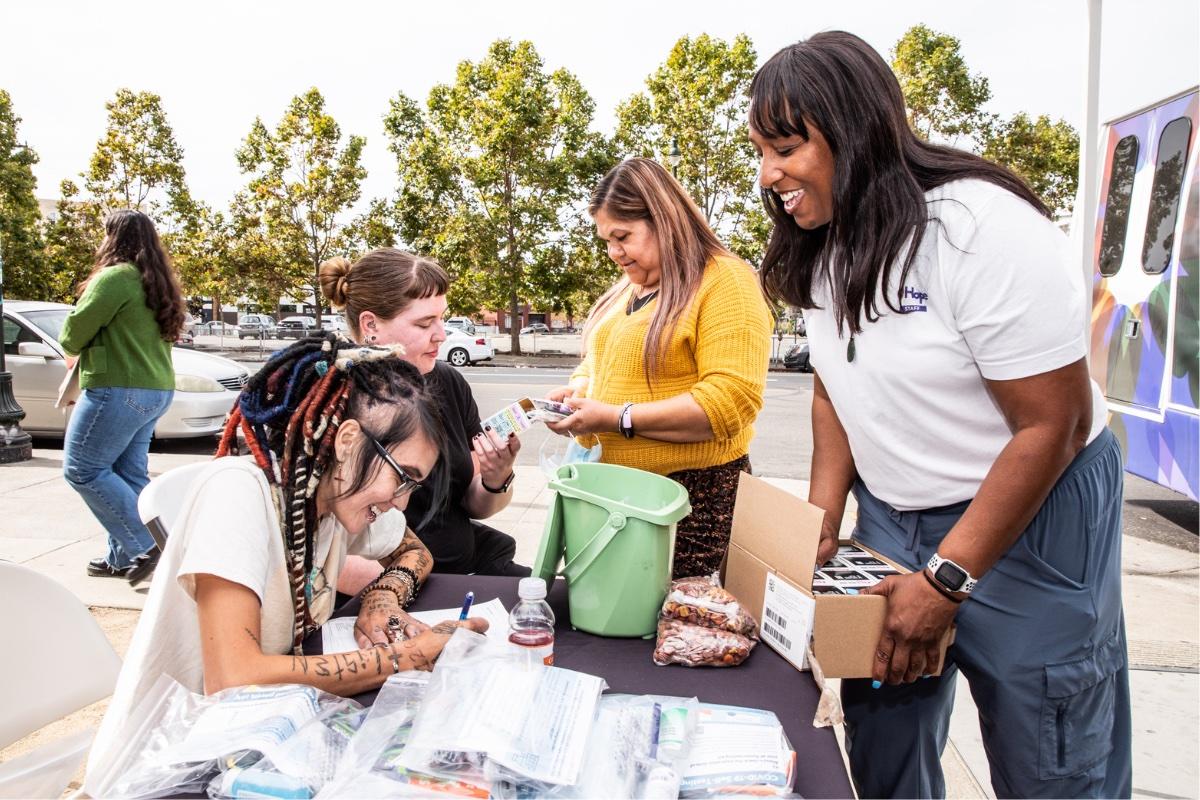
Natalie Wilson, DNP, PhD, MPH, assistant professor (far right), members of the HOPE mobile clinic and community partners provide health care services and hygiene kits in downtown Oakland, California (photo credit: Elisabeth Fall).
Reimagining Care Delivery for Patients Experiencing Homelessness
Natalie Wilson, DNP, PhD, MPH, stands inside a large van decorated with bright, welcoming designs of overlapping butterflies. The van is equipped with medical equipment, and Wilson is preparing supplies to administer HIV diagnostic tests.
The new Healthy Outcomes for People Everywhere (HOPE) mobile clinic travels out into the community to provide health care services to African Americans experiencing homelessness in Alameda County. Today, the clinic is in downtown Oakland where Wilson and her team have partnered with Cal-Pep and AIDS Project of the East Bay to provide health care and free hygiene kits.
“We need to transform health care,” says Wilson, assistant professor at the UCSF School of Nursing. “One way is reimagining care delivery.”
From bringing services directly to the community, to adapting how brick-and-mortar settings deliver care, UCSF nurses are leading innovative projects to make high-quality health care accessible to people experiencing homelessness in the Bay Area.
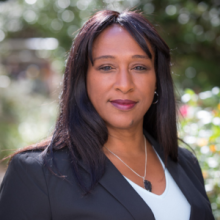
HOPE Mobile Clinic Delivers HIV Prevention and Care
Launched in mid-2023, the HOPE mobile clinic seeks to create healing-centered, integrated HIV prevention and care services, and to re-engage the African American population in care, particularly those people experiencing homelessness. Led by Wilson and Albert Liu, MD, MPH, the clinic’s team of experts is committed to ending the HIV epidemic through services tailored to specific populations.
“Our goal is to bring marginalized populations to the center of our services, to focus on people who are not able to access care,” explains Wilson.
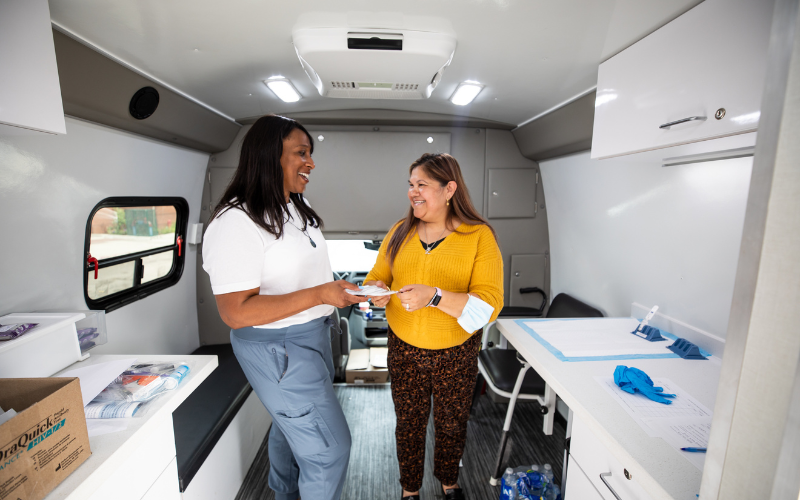
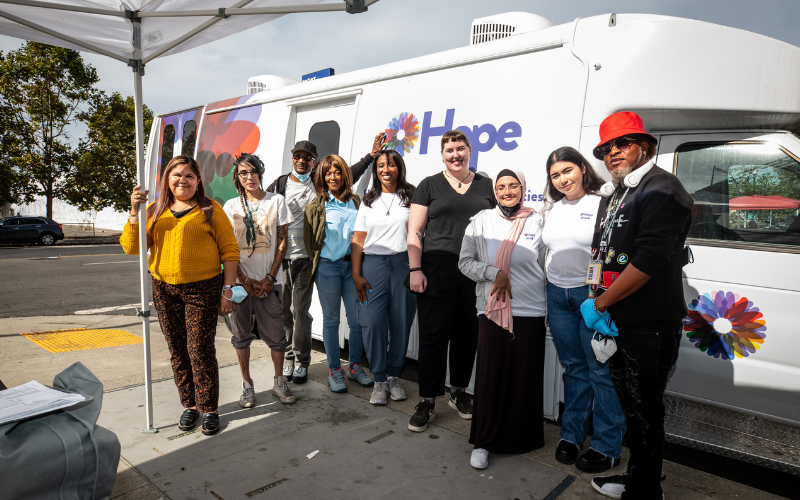
Working with the Alameda County Public Health Department and community-based organizations, the clinic travels to places where there are gaps in health delivery services and areas where there are a high number of HIV infections, late diagnoses and lower viral suppression. They offer free testing for HIV, sexually transmitted infections (STIs) and hepatitis C virus (HCV), in addition to administering COVID vaccines.
African Americans are disproportionately impacted by HIV, STIs and HCV in Alameda County, accounting for 37% of people living with HIV, 57-78% of STI cases and 36% of chronic HCV cases in the county. Further, although African Americans are less than 24% of the population of Oakland, they account for an estimated 70% of those experiencing homelessness.
This is due to many intersecting disparities, explains Wilson, including stigma, racism, discrimination, lack of access to medical care and medical mistrust.
The clinic’s van, which is owned by Heluna Health, is equipped with an examination table, a sink, a bathroom, limited medical supplies and other items routinely found in a brick-and-mortar exam room – making it possible to bring care directly to the community.
The clinic will be adding mental health and substance use disorder treatment to their services, funded by a three-year grant Wilson received from the Substance Abuse and Mental Health Services Administration's Center for Substance Abuse Prevention.
“We need to ask communities that have been marginalized what they need and deliver care in ways that are responsive to what they need and want, not what we think they should get,” says Wilson.
Leading Street Medicine Teams
In parts of the San Francisco Bay Area where Olivia deBree, MS ’15, NP, oversees teams that deliver clinical care, many people who are unhoused are unable to receive care in a traditional health care setting.
The reasons for this vary, says deBree, citing examples like not having a phone or internet to schedule and track appointments, or fear that their belongings will be taken while they are away. But the majority, she says, are deterred by past events.
“Many of our patients have experienced discrimination and trauma in health care settings,” she said. “They are hesitant to engage in care, even in very desperate situations.”
For these patients, street medicine teams are crucial.
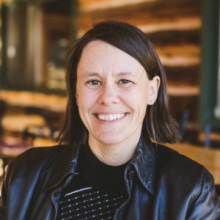
DeBree is the associate medical director of LifeLong Medical Care’s street medicine program. She provides leadership and clinical oversight for six teams providing care in homeless encampments in Emeryville, Berkeley and Oakland.
Led by registered nurses, teams include a full-time social worker and case manager, and a part-time provider – typically a physician or nurse practitioner. Working from medical vans, they offer wound care, testing and treatment for infectious diseases, medication-assisted treatment, chronic disease management and more.
Teams have specific schedules, returning to the same camps each week. In addition to clinical care, they provide approximately 6,000 pounds of food and 1,500 bottles of water each month, as well as clothing, camping gear, pet supplies and more.
“We build trust by demonstrating that we are going to be responsive to their immediate needs, whatever that looks like today,” says deBree.
Looking to the future, deBree hopes to expand pregnancy care, employ psychiatric mental health nurse practitioners and offer basic palliative care.
But she is quick to stress that clinical care is only one piece of what is needed to support patients experiencing homelessness. “We need dramatic rent decreases and more supportive housing,” she says. “Housing stability is health care.”
New Clinic at Ward 86 Offers Accessible HIV and Primary Care
“Services available to patients as soon as they walk in the door, and care plans designed to be highly flexible.” That’s what’s needed to provide comprehensive support to patients experiencing homelessness, says assistant professor Janessa Broussard, MS ’17, AGNP-C, AAHIVS.
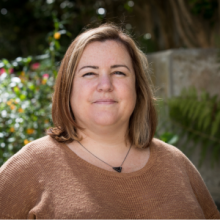
And it’s exactly what she’s doing at Ward 86.
Ward 86 at Zuckerberg San Francisco General Hospital and Trauma Center was the first dedicated HIV clinic in the United States and continues to be an international model for HIV care.
Broussard works with a new health care access point clinic at Ward 86 that provides care for people who inject drugs. Most of Broussard’s patients are experiencing homelessness and have trouble managing their appointments and navigating the health care system.
The clinic is working to meet patients’ needs by offering drop-in appointments every afternoon for patients to receive HIV testing and primary care. Providers work to design care plans that can be adapted based on the patient’s circumstances.
“We are creating a model that offers comprehensive, high-quality care in ways that are responsive to the very real challenges that people are navigating,” explains Broussard.
Broussard previously worked at the San Francisco AIDS Foundation where she oversaw the U.S.’ largest program for distributing pre-exposure prophylaxis, a medicine that reduces the chance of getting HIV from drug injection or sex. Additionally, she helped develop hepatitis C treatment services for individuals who actively use substances and are experiencing homelessness and rapid initiation of antiretroviral therapy.
“If we create models of care specific to particular communities – like people experiencing homelessness – patients will begin to get the quality health care they deserve,” says Broussard.

